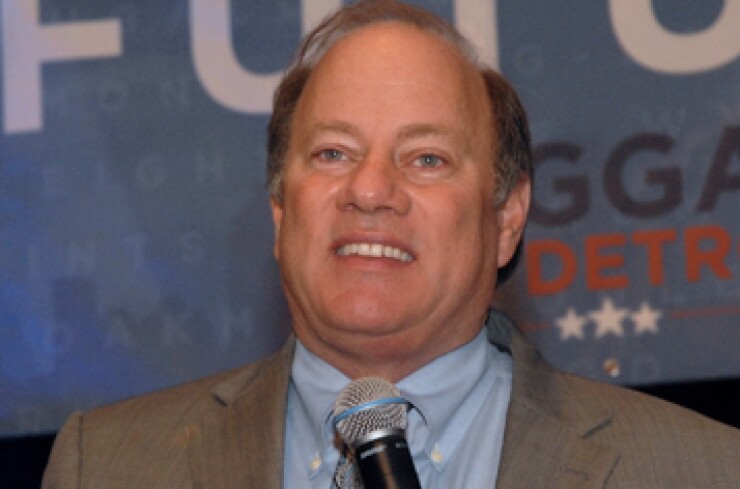
CHICAGO -- Detroit plans to refund more than $600 million of general obligation bonds in a deal that would mark its first GO sale since exiting bankruptcy.
The deal is expected to generate projected savings of about $40 million that would provide budgetary and property tax relief, said John Naglick, Detroit's finance director.
The Budget, Finance and Audit Committee approved the necessary bond authorizing resolutions Wednesday, he said, sending them on to the full council for a vote next week.
Mayor Mike Duggan's administration wants to refund up to $275 million of unlimited tax GO bonds sold in 2014 and up to $385 million of limited tax GO bonds sold in 2010 and 2012. The bonds were issued through the Michigan Finance Authority and carry a backing of the city's state distributable aid.
In Michigan, a local unit of government can only pledge such distributable state aid on bonds issued by the MFA. Accordingly, the advisors and underwriters are selected by the MFA.
First Southwest is financial advisor to both the MFA and the city. Barclays is the lead underwriter. Legal firms working on the deal include Miller Canfield Plc and Dickinson Wright PLLC.
Naglick said that savings on the LTGO bonds will benefit Detroit's general fund budget by approximately $15 million and savings on the UTGO bonds of $24 million will be used to lower the debt millage on the city's property owners.
"The city isn't extending terms, it's just straight refunding" for traditional present value savings, Naglick said. "These are MFA-backed, highly rated bonds and we are trying to see if we can take advantage of the current market situation."
Rates are in some parts of the yield curve are hitting record lows.
The 30-year muni general obligation yield reached 2.17% Wednesday, a new record low, according to the final read of Municipal Market Data's triple-A scale.
Naglick said the issuance also needs approval from the Detroit Financial Review Commission, the city's post-bankruptcy oversight board, which next meets on June 27.
"If all goes according to plan the bonds will be in the market either the last week of July or the first few days of August," he said.
Detroit filed for the largest municipal bankruptcy in the U.S. in July 2013 and exited Chapter 9 in late 2014. In August 2015, in its first post-bankruptcy bond sale, the city sold $245 million of local government loan program revenue bonds through the MFA at a steep premium.
The debt was enhanced with a statutory lien and intercept feature on the city's income taxes, which landed the deal an A rating from Standard & Poor's, which rates Detroit stand-along GOs deep in speculative-grade territory. The refunding deal would mark the Motor City's first GO issuance since leaving bankruptcy in December 2014 after shedding $7 billion in obligations, though the deal would rely on the state aid commitment to support the credit, rather than the city's own junk-bond level ratings.
The city's 2010, 2012, and 2014 distributable state aid backed bonds carry ratings that range from the single-A to double-A level depending on whether they are secured by a first, second, third or fourth lien. Naglick said that city will seek updated ratings from Moody's and S&P.
The city will promote its balanced operations as it heads into the market. Duggan said in February that the city was on track to finish fiscal year 2016 with a balanced budget and to deliver a third straight balanced budget for fiscal 2017, something it had not done since 2002.
Duggan said in February the city had "uncovered" $50 million in unspent bond funds. The funds, explained Naglick, were "leftovers" from previous bond issues. Naglick said the city doesn't expect that the slow spend down of proceeds will run afoul of tax regulations because the bonds are the subject of an Internal Revenue Service tax-exempt bond voluntary closing agreement program.
"These were previously authorized bonds for capital improvements," said Naglick. "We worked with bond counsel to go back to the original voter authorization and to make sure we use these proceeds in accordance with the authorization," said Naglick.
Duggan has proposed using $11.7 million of bond proceeds to upgrade 40 parks and playgrounds in the city over the next 18 months. Another $7.5 million of bond proceeds will fund the Police Department's Real Time Crime Center and $7 million will fund the building out of the police department's 8th precinct in northwest Detroit.





